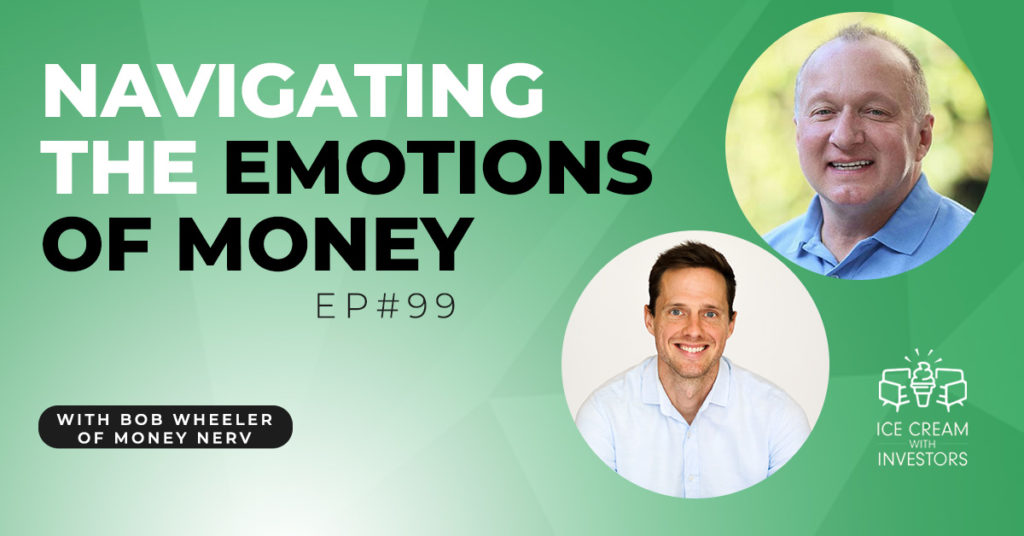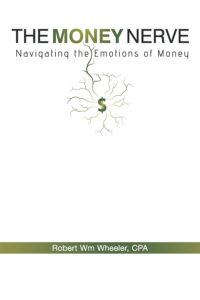When we talk about money, we talk about numbers, but many don’t know about the emotional side of money. Financial literacy allows us to balance the math side and the emotional side of money. In this episode, Bob Wheeler, the founder of Money Nerve, explains that money can be so sensitive that we can so quickly go to emotions that the logical side of money is completely lost. Through his wisdom, he shares his wisdom about money to navigate its emotions. Bob talks about the impact of taxes, doing adjustments, etc. Tune in to this episode as Bob shares his wisdom to help you navigate your emotion for better financial decision-making.
For more of this topic you can reach to Bob Wheeler:
LinkedIn: https://www.linkedin.com/in/bob-wheeler-88029512/
Twitter : https://twitter.com/themoneynerve
Or you can grab his book now!
Money Nerve: Navigating The Emotions Of Money
—
Watch the episode here
Listen to the podcast here
Navigating The Emotions Of Money With Bob Wheeler Of Money Nerve
In this episode, we have Bob Wheeler. Bob is a man of true intrigue and infectious energy and is on a crusade for personal growth and has cross-pollinated his comedy with his accounting practice to create a new approach to personal finance. His passion to help others gain insight about their emotions trigger financial decisions. Combining finances with behavior, Bob explores his personal concept of creating a healthy relationship with money in his book, The Money Nerve. While strengthening his accounting practice, Bob has simultaneously pursued the love of satire and ventured into the realm of stand-up comedy, where he’s also the CFO of the world-famous Comedy Store in Los Angeles. I’m super excited for this conversation. Bob, welcome to the show.
Matt, it’s great to be here.
We like to start the readers with the most difficult questions here. What’s your favorite ice cream?
Coffee.
Any flavors? Any toppings or anything on it?
I’m willing to add a few more things, a little chocolate to the mocha, but since I was like four years old, coffee ice cream, that does it for me.
If we’re ever out in LA, is there a good coffee ice cream shop that we need to be on the lookout for?
Cold Stone has a pretty good coffee ice cream. There are some cool gelato places that have perfected the Italian coffee. I’m easy. If it’s got coffee in the ice cream, I’m there.
I think you’re the first one to say that, so I can get down with it. Bob, tell our readers, what’s the scoop? What do you do now?
I have a CPA practice. I’ve got about 1,000 clients and that’s what got me into being the CFO at the Comedy Store, got me into the whole money and emotions stuff. I, CFO of the world-famous Comedy Store, many years that I’ve been connected with them. I wrote a book, The Money Nerve. We talked about this briefly before we started. My whole thing is I want to talk about money.
I want to talk about money to help neutralize, normalize the conversation. Most people, when they talk with their spouse about money, they think I say, “Go have a fight. Go have some conflict,” because money is such a trigger. To be able to say, “Let’s talk about money. What’s your perspective? What’s what are your beliefs?”
What I find is that there’s so much shame around the lack of financial literacy. People think they’re the only ones that don’t know. People out there feel like they’re the only one. Even though I’m highly successful and I’ve got all these great things and my resumé looks good on paper, if they only knew the truth, I’m guessing. Most of us are trying to figure it out. Wanting to have conversations around money to help people start to realize we’re all trying to figure it out.
Why do you think there’s a taboo around money?
Money from the beginning of time, it’s how we judge people. You’re in my tribe. You’re not in my tribe. You’re not rich enough. You’re too rich. If you’ve got a lot, how can I take it from you? It ties to our job status. “You’re a superstar because you make this money and you drive that car and you drive in this neighborhood.” Whether it’s trading bags of salt or camels or whatever it is, we have been trading in monetary exchange since the beginning.
I love this concept of everybody has an emotional side to money. We were chatting before that. I believe when you’re thinking about money, there are numbers and what the math tells you should do. There’s a motion and what your emotions tell you should do. The real answer for what you should do in a given situation is a mixture of both of those.
If you go math all the time, then sometimes you can’t sleep at night, but if you go emotion all the time, then you miss out on risky or opportunities that could help you accelerate your wealth journey. There’s a mixture of both. I’m assuming that you sit down with folks and help them work through that process. Where do they even begin? If I don’t know anything about money and I’m trying to figure out my emotions, where do I even begin?
The first question I ask people is, “Are you willing to feel uncomfortable? Are you willing to do some work?” If the answer is no to both of those, there’s no point in going any further. What I’ve discovered is I need to know your story. What did you learn when you were 4, 5 and 6? Did you have some traumatic experience around money or did you have some amazing experience around money? Did you grow up in a conservative culture? Did you grow up in a religious family where money means generosity or money means being selfish? There are so many different ways that we get layered early on and say, “You’re not as smart as your brother. Your sister knows how to save a buck. What’s wrong with you?” “I don’t know.”
It starts early. I want to know the history and start to figure out what are the beliefs you picked up along the way? What did mom and dad or grandma and grandpa say or more specifically, what did they not say? “How much do you make, grandma?” “How dare you? Don’t ask that question.” I want to get all the baggage so that we can then start to undo the learning that we picked up early on and see if there’s something we can replace it with that serves us better.
Talk about money to help neutralize and normalize the conversation.CLICK TO TWEET
Let’s go ad hoc here. We might cut this, but my money experience is my mom was super conservative about money. Annuities, pension. She worked as a school teacher, went on to get her PhD and became an administrator of school systems. My dad was an entrepreneur. Never had a W-2 his entire time. It was so weird to see the dichotomy in my family of super saver, make safe investments, buy CDs, government bonds and dad going entrepreneur.
When times were good, we went to the World Series and on vacation. When times were bad, there was a little bit of stress in the family household. I have no idea where this passion of learning about money and the different ways that you can make money, save money, invest money and all that comes from. Where would you take me if I sat down with you and gave you that background?
The first thing I would imagine is when you see your dad being an entrepreneur and not having the money all the time, there might have been a little bit of disappointment or anger or frustration on your mom’s part that he wasn’t doing it the right way. He may have been saying to the kids, “Look how much fun we have. When it’s good, it’s good.” As a kid, you might be going, “That looks more fun,” except when the negative stuff comes in. That feels pretty horrible.
I wonder if there’s a different way to do it. I wonder if maybe looking at two very opposite ways of approaching money caused you to say, “Is there a way to find something in the middle of that between the math and the money?” I work with a lot of teachers and people in that industry whose partners are entrepreneurs and the teachers tend to be more rigid.
I had a client come in and he was like, “This is my wife. She’s a teacher.” She’s like, “Can you tell him he’s doing everything wrong? He’s doing everything wrong. You don’t have to have a budget. You can’t be an entrepreneur. You spend that.” I’m like, “Oh no.” You can see him want to curl up and die because he’s like, “I love her, but we have this thing around money.” That might be where it started, where your mom’s sitting down strict. It’s very clear, clean cut, black and white and your dad’s like, “No, there’s lots of gray.”
It’s funny that you say that because I have this conversation with my parents a lot now that I’ve delved into the world of finance. Mom says that all the time. It’s like, “Matt, I wasn’t as risky as you were are and things like that.” I do get this drive from my dad to go create and make more money and find ways to make a deal happen and all that stuff. In return, I take that money and I shove it into real estate, which I think is one of the safest assets you can have when done correctly to build up cashflow, to protect me from when times are bad. Knowing that I will always still have money coming in from the assets that I own. It’s interesting that you say because I do have the best of both worlds, I would think.
Yes, and maybe a little bit of PTSD from the worst parts.
I shoved that deep down inside.
Bury it for sure.

Money Nerve: Money means generosity, or money means being selfish.
One of the conversations I’m always trying to extract too when I talk to folks like yourself is, how do you encourage people to go have conversations with their partner about money too? I run across a lot of folks that maybe the wife is very big into real estate and investing. The husband is more risk-averse and there is a money story behind it. How do you encourage them to have conversations? Do you encourage them to have like weekly cadences? What does that all look like?
What I do with my clients is I give them my book and make them read it together because, in the book, there are calls to action at the end of each chapter, so it’s an opportunity for spouses to sit there and go, “What did you learn as a kid? Do you like to spend? Do you like to save?” I try to find a neutral space for them to come together.
I think people should get together at least once a week but at a minimum once a month. They should be getting together and going through the numbers saying, “We did pretty good this month or next month is going to be a little bit tighter because we’ve got a vacation coming up and we didn’t put the money aside yet.” You got to have those conversations. Many people don’t have money meetings. They don’t meet on Sunday nights or Tuesday mornings or whenever, but you got to find a time that works for both people. Sometimes it’s good to include the kids if there are kids.
They may not get to hear all the parts of the conversation that might be stressful but start including the kids as participants in the family money management. Make an agreement that if it starts to get heated that somebody can hit a pause button and take a five-minute break. Go cool off, then come back because we can so quickly go to emotions that the logic, the black and white of 2 plus 2 is 4 is completely lost.
I know we were talking before the show. This is a perfect transition about you are in the process of writing children’s books about teaching them about finance. The question I have is how do you bring your children involved in that or into that conversation? Is there a certain age where you see that? Are there different ways you can teach them? What does that look like?
The minute that they could start saying, “Give me,” is a good time to say, “I’ll give you but let’s put some into savings.” I know a lot of people that if the kid gets $10, $5 goes into savings and the other $5. I know one couple. The $5 that they get, 20% goes to mommy for all the work she puts into that family then they get 30%. Get them to immediately start thinking that all the money is not mine for the moment like, “Let me put it aside for the future. It is mine but let’s be smart about it.” Delayed gratification. The more we can teach kids that, the better.
I was in a toy store and I tell the story a few times. It was February. A kid had asked for a toy and the mom said, “That’s it. I’m telling Santa Claus you are off the list.” It’s February. He’s got ten months to Christmas. He’s begging and pleading, “Please don’t tell Santa,” traumatizing the heck out of a kid. She could have said, “Timmy, we don’t have the money in the budget now, but that’s something we can plan for later or we could take it out of your savings account or all I’ll match it. I’ll pay 50% if you pay 50%.” There were all kinds of opportunities to have a healthier conversation rather than shame him or take him out by the blackmail of, “I’m going to tell Santa Claus.” To a 5, 6-year-old kid, they can’t process that.
Think ten months in advance. I like the idea of you pay half and I’ll pay half figuring it out. Do you encourage kids to do chores to make money or how should they be?
I think chores are a very important piece of financial literacy. There’ve been studies and maybe it’s changed since everybody’s a computer baby. There have been studies that have shown getting paid an allowance for doing chores helps people to start to be aware of financial responsibility, the rewards of working hard. It’s an important component of starting to get kids familiar with money.
We can so quickly go to emotions that the logic is completely lost.CLICK TO TWEET
I’m going deep on this because, as we started the conversation, your money beliefs when you are a child ultimately transform you into who you are as an adult. A lot of the things that you do is try to break people from their money beliefs or teach them how to process their money beliefs. When you’re thinking about having kids and how do you teach them about money, it comes full circle and that’s what I’m trying to dig out of this.
Here’s the thing. I’ll clearly say, I don’t blame my parents because they didn’t know what they were doing. There’s no blame here. I’ve had other people tell me the same thing. “I would save money. My parents struggled. They would borrow my money.” When I’m twelve years old and my money disappears, I’m thinking, “What’s the point of saving? Somebody is going to come in and take it.” Other people that told me, “My dad would come in and say, ‘I need to borrow $100 out of your savings.’ I’m ten years old and I’m like, “No, you can’t.’ Dad’s like, ‘Haha, I’m taking it. I’m your dad.’”
Those kinds of experiences, kids pick that up. They remember that stuff and you go, “It was no big deal.” When you’re a kid, like for me, $100, that’s pretty exciting. To watch somebody else come in and go, “Thank you for saving that. That’s going to help me out,” that had seemingly no value or appreciation for that $100, was harsh for me.
One of the things we were talking about before, too, is that you have climbed Mount Kilimanjaro in Africa and I have as well. I did it in 2012. It reshaped how I thought about America when I came back. I’m interested to hear, how was that experience in terms of a financial lens and your perspective on money?
Going to Africa was a big mind shift for me. Very much against my will. When I got to Africa, I was amazed at how happy people were, how grateful people were, how little they had. In Tanzania, the average income was $100 per person a year for income. I’m like, “Are you kidding me? That’s like that’s half a day on Monday.” I couldn’t get over the fact. I’m like, “What’s wrong with these people? They’re so happy. They don’t have material things. What’s wrong with them? Don’t you get it?”
I would throw away a piece of trash and they would ask if they could have it because it was a container. It was something they could reuse. I had to look at them and initially, I kept going, “What’s wrong with them?” I had to stop it and go, “You’re running around like crazy trying to be happier, try to accumulate all this stuff. These people don’t have any of that stuff and they’re incredibly happy. Maybe you need to rethink some stuff.” Don’t get me wrong. I still like driving a nice car. I like having a nice meal. I’m grateful if I have hot water and electricity and the basic clean air kinds of things. It taught me gratitude.
I remember going and we were on a dirt road headed to the hotel. When I say there are no street lights, it was dark. It’s the darkest I’ve ever seen anything in my life. I remember we were coming closer to the hotel and there was this car off the side of the road that had like lost control or whatever. I was telling the story when I came back to America and the person was very insightful, who I was telling the story too.
He said, “Remember how the little things matter, even if it’s something like a little guardrail that can keep you on the road street lights and the roads paved. You know what side of the road to drive on.” It made me appreciate everything we have in this country that others parts of the world would be a luxury.
That reminds me of when I was in India. I saw this woman on the side of the road because, unfortunately, the women do most of the labor in India. This poor woman was pulling this cart and she had some tubing on it. I said, “What do you think’s going on there?” He said, “She’s probably walking into town, which is a four-hour walk to go to the Home Depot and get new tubing.” I was thinking, “What if you get the wrong tubing?” I’m lucky I can get my car and in 50 minutes, I’m at a hardware store, but if I’m walking and pulling a cart? I got to manage my day a whole lot more than somebody like me who can do anything in an instant.

Money Nerve: One of the first things people have to do is get on the same page, agree that we’re going to put aside 10% or 15% and that we want to invest so that we’re not constantly fighting, rehashing out the same conversation.
Measure twice, cut once. Transitioning back to the conversation about money and couples. If you’ve got couples that come into you and you’ve got them understanding their money, beliefs and their emotions. I know you talk about baby steps to help them continue down their financial path. What easy, low-hanging fruits should people be doing when they’re investing their money and thinking about?
I think one of the first things people have to do is get on the same page. Agree that we’re going to put aside 10% or 15% and that we want to invest so that we’re not constantly fighting and rehashing out the same conversation. It’s important to get on the same page. At a minimum, people need to be putting aside 10%, 15%. People need to be looking at, do we have three months or six months’ worth of money to cover the necessities.
If you don’t have six, fine, do three. If you don’t have three, do one. The reason I talk about baby steps is because a lot of times, we want to get from A to Z. The reality is you can’t get from A to Z. It’s too big of a leap. If you focus on getting to B, great. I’ll get half a month’s worth of income saved up to cover expenses. Now, I’ll get two a month. Most of us didn’t get in debt in five minutes. It took us a while. It’s going to take us a little time to get out of it, but if you stay focused and you commit to making these little adjustments.
I have seen people making $60,000-$70,000 turn around and pay off $50,000-$60,000 worth of debt in a couple of years because they were so laser-focused. They’re not out eating dinner every night. They’re not going to the movies on the weekends. They’re using Hulu or whatever. They’re finding ways to not spend money, still live their lives and super laser-focused on getting rid of that debt. I think you have to pick those goals and they have to be shared goals. Saving is the first place and agreeing paying off debt.
Probably, the biggest thing is to come up with an agreement on how you spend money. Anything over $500 requires a group decision or whatever that number is or each of them have their own, “I can do what I want” account. They don’t have to justify but find ways that help you both win and work together through automated savings, things like that where you can put money into. You’re buying gold and all these little things.
I initially set up six different savings accounts. It had $50.24 every week coming out of all these different accounts. I was so busy, money coming in and that’s fine. I didn’t notice it. If I was waiting to write a check for $2,000, I would have been like, “Not yet.” $25 here, $50 there, that equals $2,000, but I didn’t feel it. I had to track myself.
I think it’s about getting going and getting good. Often in life and myself included, I struggled with this a lot. Seeing the end goal and thinking, “That’s too far away,” having those small goals. Atomic Habits written by James Clear is a phenomenal book. One of the concepts he talks about is the accumulation of marginal gains if you can get 1% better every day.
One of the things I like to talk about is having an in-state, be very clear on that, then do one five-minute tasks every single day that marches you towards that. For this conversation, it could be something as little as move a dollar from your checking account to your savings account. If you start doing that repeatedly, now money is at the top of your mind. You are making a small step forward. It’s not going to get you there in the time that you want it to, but it is a step in the right direction and that will build on top of each other.
For me, I have to obsess about something. When I finally said, “I’ve got some bad financial habits. I’m going to change this.” I went out and bought like 30 books. Now, did I read all 30 books? No, but I had them stacked on both sides of my nightstand. It was in my face. I had post-it notes. “Look at your money.” I had to like, “I’ve given myself enough notice. Let’s deal with some of this stuff.” You have to want it.
Getting paid for chores helps kids become aware of financial responsibility and the rewards of working hard. It’s an essential component of starting to get kids familiar with money.CLICK TO TWEET
I think you do have to obsess about it, whether you want to lose weight, invest, get rid of debt. Sorry to all the dog lovers. I’m a dog lover, but sometimes you have these crazy people that go out and save animals. God bless them. We need them. This lady would not let me have the cat until she checked my house and my credit and everything. I’m like, “I’m trying to take a cat in.” She’s like, “No,” but we need those people. They’re fanatical. They’re the ones out there doing the work. You have to be fanatical doing the work for your own stuff.
We are a real estate show and you teased me with a little bit of a real estate story in your history that I would love to discuss now. I don’t know how to ask it other than, can you tell us the real estate journey and some of the things you’ve done in real estate?
I’ll tell you one of my nightmare stories. Here’s the thing, I think real estate is great. I love real estate. It’s tangible. If everything else goes south, I can go sit on my property and pitch a tent. It’s real. Everybody’s different, but for me, I was like, “I’m going to have a real estate empire. I’m going to take over the entire world.” Except, I’m probably too nice to be managing it. You can own property. You don’t have to manage it.
I went in on this apartment with a client of mine in an area that was going to be up and coming. It up and went. It never went anywhere. It was a horrible neighborhood. A prospective tenant came by and as they came by, there was a shooting in the street. They were like, “I think I’m going to.” We’re like, “No, there’s only one shooting a month. Come back. We’ll give you a post-shot discount.” Bad neighborhood. One of the units was empty.
As luck would have it, just finished getting the whole thing finished, appliances and repainted. This guy in a gang had gotten out of prison and needed a new place to have an office. He had to live on the same street and he saw that vacant apartment. He thought, “That’d be nice.” He broke in and started using that as his place and the police would come by and he’d run away. Now luckily, because he had gotten out of prison and the police could look and see, they were like, “This guy’s trouble.” It took a little bit of time.
They keep destroying the appliances then I’m like, “I’m going to repaint it and all this stuff.” People are good people. They’re not going to touch. Breaks in again. Graffiti’s the whole wall, then I’m like, “I’m starting to like go dark.” I decide I’m going to get like, “You can rent attack dogs.” I’m like, “I’m going to get like three attack dogs to have put them there early in the morning. Those dogs are going to take care of things.”
I’m thinking, “If they get eaten alive, all the better,” then I’m like, “What are you doing? You’re plotting potential murder so you can rent out your apartments. You probably need to sell this unit and get out of the neighborhood.” It got so crazy because I was so frustrated and I think that’s what happens. At the time I was doing that, I wasn’t rolling in dough. When I’m putting in $5,000. That’s hard to spend money.
A tenant called me on another property and they’re like, “The Rooter people came out or whoever it was, but somebody came out and they told him it’s $20,000 to fix the plumbing air. There’s toilet waste going under the house and I’ve got to go stay in a hotel.” I paid a guy the next day to go out for $250. He’s like, “There’s nothing there. It was this little thing.”
I’m not a plumber, but I knew a couple of people that could double-check the work of the first person because I’m not one that’s going to write a check for $20,000. That, for me, when I was first doing it, for a lot of people, when you’re putting in your hard-earned money into something that’s going to pay back, it’s heart-wrenching when people take and graffiti it or kick in a wall or scratch the refrigerator. It felt like a personal assault.

Money Nerve: Focus on getting to be great, and you commit to making little adjustments.
Working with your clients, where have you seen real estate work for them and where have you seen it not work for them? Are there any commonalities there?
Real estate can work for everybody if you can get everything to align. Where it works is where people are good about boundaries. If they’re managing it themselves, collecting the rent, it’s so important to make sure you screen your tenants. Having a bad tenant is going to take you on a path. I always tell people, “If you’re not sure, if you have any doubt about a tenant, say no.” Don’t prove yourself right. “I don’t like to prove myself right anymore. I have a bad feeling. You’re gone. I’m not even going to find out.”
With real estate, even some of my clients that make over 150 AGI, which is a lot of my clients, they’re not going to get any deductions against that income if it’s at a loss, but they are going to get those passive loss carryforwards. They’re going to be a lot of great tax advantages. Even if you’re not income-wise on paper making profit, you still got to be able to parlay those losses into offsetting, capital gains and things later on.
I’ve had people go out and buy a property and they’re like, “I can’t wait to get this right off.” I’m like, “You’re already paying zero taxes, so getting a bigger write-off means you’re still going to pay zero taxes. Not zero taxes plus a hundred.” They’re like, “What do you mean?” Everybody’s situation is different. You got to make sure what’s going to be the impact on the taxes, whether you’re writing off a mortgage, a triplex. For a lot of my clients, I try to get them into a duplex or a triplex to start off. I have a lot of people in entertainment. That way, if their gig goes south, they don’t get renewed for a season. They’ve got two other people or another person paying their mortgage.
Let’s talk about the AGI for a second because the first property I ever bought, I thought the exact same thing. I’m going to not pay taxes for the rest of my life. This is the greatest thing ever, then my accountant came to me and said, “You make more than $150,000 a year, which means that you can’t deduct down past zero. Whatever your rental income is, you can only take it down to zero and you carry forward depreciation. You don’t get to write off passive losses onto active income.”
A painful loss for a lot of people.
Anything I missed there because I want to make sure?
No, I think it’s so important unless you’re a real estate professional or you can show that you put in a certain number of hours and there are a bunch of criteria. We do have certain clients that meet that criteria, then they can write off 100%. For the most part, I have that happen to so many clients. They’re like, “Where’s my big write-off?” I’m like, “Here’s the good news and the bad news. You’re making more than $150,000. The bad news is, you’re limited.”
You do get to carry those forward, so if you have an appreciation, a capital gain in the future or you need some passive losses. You get to carry those forward.
It’s so important to make sure you screen your tenants.CLICK TO TWEET
It’s one of the places where I will say this because you don’t have all the receipts, but you’re picking that stuff up. By the time you get to write that stuff off ten years later, IRS is not coming back and asking you for the receipts on the capital loss carry forward. Take that for however you want to interpret that.
We are two people talking on the internet. Don’t sit with us. Fantastic conversation. I want to shift us now into our last round. We’re calling this the five toppings. Our first one is, what is your favorite book or what’s a book you’ve read that’s given you a paradigm shift?
My favorite book is The Power of Focus. It’s been out for a while, Jack Canfield. It’s a great book on how to get things done, how to get organized and how to create those habits. Successful life is creating lots of healthy habits that keep us on track. It doesn’t mean you can’t still have fun and you can still be spontaneous. The Power of Focus, for me, was a game changer and I love giving that book out. I think the book that I just read Outliers, even though I know it’s been out for a little bit. I found that very fascinating, so much so that I kept bringing it up in my podcast. People are like, “Could you stop mentioning the book?” I’m like, “Sorry. I like the book.”
I will always read anything Malcolm Gladwell writes because I believe he’s so good in digging in and Outliers is fantastic. Our second one is I believe that the person you become ten years from now is directly correlated to the habits that you have and the things you do every single day. What are some of the habits that you do every day?
I walk an hour every day. I purposely have two big dogs that force me to get up and make me walk. That’s a great time for me to clear my mind. I don’t look at my phone. I don’t even listen to music. I’m walking and stuff comes up. The other habit that I do that I find to be helpful is I map out my day the night before. I remind myself, “You need to get up.” I get up at 5:30 anyway. Most mornings, I get up at 5:30, walk the dogs, then I’ve gotten to like 8:00 in the morning to work out, meditate, all those fun things, then 8:00 starts to get crazy.
If I at least remind myself, “You’ve got a podcast at 9:00 in the morning. You’ve got to be at the dentist.” Whatever those things are, I mapped that out to remind myself, “Get up a little bit earlier.” If it’s something special and I haven’t had a lot of sleep. I’m going to lay out my clothes. Say that when I wake up going, “I got to find coffee. There are my clothes. Here’s my list.” I try to prepare myself to wake up like a fireman and be ready to go.
I love it. Our third one is, what’s the best piece of advice you’ve ever received?
For me, the best piece of advice I ever received was from my boy scout leader. I got a scholarship and the opportunity to go to this college, Rhodes College. I was going to stay and go to the local college and help my mom out. My parents had gone through a divorce. My boy scout leader came to me and he said, “I heard you got this opportunity to go to Rhodes College, but I heard you’re going to stay?” I said, “Yes, I’m thinking I’m probably staying out my mom.” He said, “If you stay, I will get you a job managing one of my burger joints or doing whatever you want to do. My advice to you is to get the hell out of town. Don’t look back. Take that opportunity and run with it because not everybody gets those kinds of opportunities.”
He used a couple of cuss words that I kept going, “My boy scout leader cussed at me.” I love the University of Tennessee. That’s where I wanted to go. I have orange boxers and I see smoking in the back. I was going to go to Austin Pea but ultimately, go to Rhodes College significantly changed my life. I got to meet a lot of people I never would have met. I got to see the world from a perspective that I’d never seen. I am so thankful that boy scout later told me to run and don’t look back.

Money Nerve: Come up with an agreement on how you spend money. Anything over $500 requires a group decision.
Everything is kept on the internet forever. I’m going to publicly state, I believe that one of the most impactful things that a young person could do is move away from home. I believe that we should have a service year in America where you do one year of service to your country, whether it’s military or working at the post office or writing code for whatever application.
It has to be in a time zone away from where you live. That brings people together under community but also, gets them to see a different part of the country that they’re not going to get to experience. That’ll help us all come together a little bit better. I love that runaway and don’t look back. Our fourth one is, what’s the thing you’re most proud of in your life?
The thing I’m most proud of is two things. One, I was proud of getting my name on the Comedy Store building as a paid regular. Most people are going to like, “What?” That’s a big deal in the entertainment world. The other thing I’m proud of is I built my CPA practice from a one-person accounting firm to fourteen employees. We do international. I’m not working out of my bedroom in my underwear. I have an office with a full staff. That feels like a big accomplishment to look back and say, “I’ve turned this into a profitable business that serves people.”
That’s awesome. Our last one is, if you could sit down and eat a bowl of ice cream with anyone, dead or alive, who would it be and why?
I would love to sit down with Martin Luther King.
Why?
I think he was insightful. Even though I know some of his beliefs and stuff came from Gandhi and all these other things. I would love to be able to pick his brain and see how he was able to at least appear to stay grounded in a very volatile time period, where there was a lot of hate and a lot of crazy and still said, “I’m going to move forward in a non-violent way.” It’s so big picture and beyond most of us to have that capacity to forgive. We’d probably be a lot happier and healthier if we all could learn to forgive and move forward. He’s a person that inspires me. I would love to be able to get the inside scoop a little bit more.
There’s a handful of people I named when I get asked that question and returned and he’s one of them. I think his ability to stay dedicated to the mission but be flexible in his tactics is very underrated in history. Bob, fantastic conversation. I appreciate having you on. If our readers wanted to reach out to you and get connected or learn more about you and everything you’ve got going on at The Money Nerve, where’s the best place we could point them?
The website is TheMoneyNerve.com. That’s got my podcast, my online course, the book, free resources and information about my accounting firm and check it out. Feel free to reach out Info@TheMoneyNerve.com. We love interacting with folks and, hopefully, helping people get on a healthier relationship with their money.
Got to come to see you out in LA.
Sounds good. Come on out. We’ll take you to the Comedy Store.
Appreciate it.
Important Links
- Bob Wheeler – LinkedIn
- The Money Nerve
- Comedy Store
- Atomic Habits
- The Power of Focus
- Outliers
- TheMoneyNerve.com
- Info@TheMoneyNerve.com
About Bob Wheeler

As a man of true integrity with infectious energy, Bob’s crusade for personal growth has cross-pollinated comedy with his accounting practice to create a new approach to personal finances. His passion is to help others gain insights about how their emotions trigger financial decisions. Combining finances with behaviors, Bob explores his personal concept of creating a healthy relationship with money in his book, The Money Nerve.






